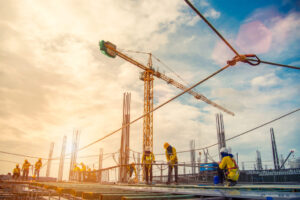Industries with High Risk for Employees
Regardless of your job or what industry you work in, there’s always some risk of sustaining an on-the-job injury. It can happen in a warehouse, grocery store, office, construction site, and more.

While this is true, some industries present more of a risk to employees than others. Knowing these industries can help you decide if this is a field you want to work in.
If you are ever in a situation where you are injured on the job, regardless of how risky your industry is considered, remember you have rights. Our team at Hines Law is ready to help you protect your rights and recover the compensation you deserve after being injured at work.
Now, let’s dive into the riskiest industries for employees.
Related Article: WHITE COLLAR WORKERS’ COMPENSATION INJURIES IN ATLANTA
1. Construction
This should be obvious but working in construction is risky. As a construction worker, you must work with hazardous materials, and in some cases, work at heights, which increases the possibility of a serious injury.
In the U.S. alone, more than half of all work-related injuries are caused by falls. Older workers are especially at risk, as they are more likely to suffer an injury.
While the construction industry has taken steps to help address this, requiring hard hats and other types of protective equipment, the risk is still there. While this is true, there are some situations where worker error or negligence results in serious yet avoidable accidents.
2. Logging
The fatal injury rate in the logging industry is 111 out of 100K workers. The most common causes of fatal accidents include coming in contact with equipment or objects.
Logging workers must harvest forests to provide raw materials for various goods, such as cardboard, paper, wood, and more. Most workers spend virtually all their time outside, in the forest, and in other isolated areas.
Heavy machinery is used to handle logs and fell trees. This all leads to extremely dangerous and risky working conditions.
3. Mining
While the mining industry had come a long way since the time of the Industrial Revolution, when miners worked in extremely dangerous conditions with minimal safety measures in place for protection, this industry still poses some risks.
Besides the potentially serious situations such as cave-ins, floods, and other similar dangerous working conditions, miners are also exposed to potentially toxic materials, such as radon and mercury. These can have a serious impact on the overall health of these workers and result in many serious illnesses.
Unfortunately, many mining companies try to avoid addressing the long-term side effects of mining. They often fail to provide their team with the necessary protection equipment, such as ear protectors, ventilation systems, or respirators.
4. Health Services
Healthcare doesn’t seem to be a risky industry at first. However, those who work in this field often work long hours and are in a non-stop, stressful environment. Also, studies have shown ongoing exposure to sick individuals takes its toll on these workers.
While most hospitals have extensive safeguards in place to maintain a sterile environment, issues like needle-stick injuries can still occur.
5. Manufacturing
The manufacturing industry covers everything from furniture production to food, textile, and more. With so many paths, the risks associated with this industry are vast. If you work in the manufacturing sector, you often operate heavy machinery and are around hazardous materials.
With automation starting to be used more and more in the manufacturing sector, it is predicted that the number of accidents that occur will be reduced. However, as long aspeople work in this industry, there is a risk of injury and death.
6. Fishing and Fishers
In the fishing industry, equipment like traps and nets are used to collect fish. Most of the accidents that occur in this industry involve falls from boats and other related boat accidents.
Also, since fishers spend long hours, multiple days, and more on the water, doing physical work, the risk of an accident and injury is higher than in many other industries.
7. Refuse Collectors
These workers spend a lot of time with their team, riding or driving on a truck to collect materials. This makes the risk of transportation-related accidents high. These individuals can work in both the private and public sectors, depending on their location. They must also work throughout the year, regardless of the conditions or weather.
How to Handle Work-Related Accidents
If you work in a high-risk industry, the possibility of an accident and injury is high. Even if you don’t work in one of the high-risk industries, accidents and injuries can occur.
When you suffer a work-related accident, you must act quickly and contact our team of attorneys for help. We will help protect your rights and ensure you get the compensation you deserve. If you need help, contact our team at Hines Law by calling (770) 746-7909.
Read More
